grammar 现在进行时表将来111111
grammar_现在进行时表将来
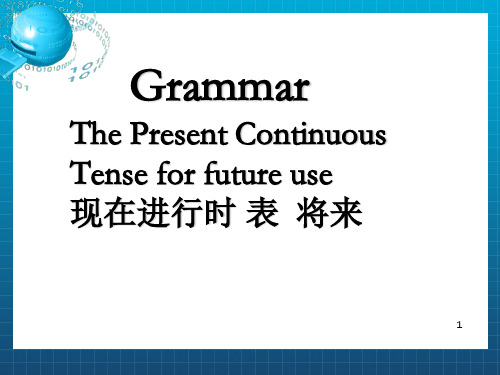
I was about to go swimming when my guide shouted at
me and told me not to do so.
我正要去游泳, 这时向导大声叫我不要去。
⑤一般现在时ave, move, start, return, arrive, begin,
_____a_r_e_s_t_ay(isntgay) in Beijing for a
week. They ______a_re_ g(gooin)gto Xi’an.
They _______a_re__ge(tgtient)gthere by air.
14
表将来的时态其他方法:
• He will write you a letter next week. • We’re not going to have any classes n
We are going to have a meeting today.
③ be to+动词原形:表示按计划要发生的事或征求 对方意见,事先安排好的。
16
Are we to go on with this work?
④ be about to+动词原形,表示即将发生的动作,不 与表示将来的时间状语连用。
(comies)ctomminygoffice after work. I
(drive) hoamednroivwin.g
19
请用5句话表达下面所有的信息。
期中考快到了,全班同学都正在忙 着复习。Lucy,你的老朋友, 在考试前 夕总会生病。这个周末,你和Minnie 打
算去探望她,并且给她带束花。然后, 你们还会到电影院看场电影轻松一下。
23
•内容(全部信息):5分 5 sentences
现在进行时表将来谈论即将到来的事情

现在进行时表将来谈论即将到来的事情现在进行时(Present Continuous Tense)是英语语法中一个被广泛使用的时态,用来表示目前正在发生的动作或事件。
然而,在某些情况下,现在进行时也可以用来表达即将到来的事情。
本文将探讨现在进行时在这种情况下的用法和例子。
一、现在进行时表将来的一般用法1. 表示预定的安排或计划:- 我们星期六上午去参观博物馆。
- 她下个月去纽约度假。
- 明天晚上我们一起去看电影。
2. 表示即将发生的未来事件:- 他现在正在准备下个月的考试。
- 妈妈正在做明天的晚饭。
- 我们亲友聚会上的准备工作正在进行。
3. 表示计划或安排尚未完全确定:- 明天我可能会和朋友一起去购物。
- 我们也许会在晚上一起去跑步。
- 他们可能会在周末去海滩度假。
二、现在进行时表将来的其他特殊用法1. 表示不断重复发生的未来事件:- 每天早上七点,他都在打扫房间。
- 下个星期五,他们将在这里进行例会。
- 每个月的最后一天,我都在检查账目。
2. 表示不确定的未来活动:- 我的车子坏了,所以我得找个修理厂修理它。
- 我的电话没电了,我必须找个地方充电。
- 他的电脑崩溃了,所以他得去修理它。
3. 表示计划或安排已经做出但未来有可能改变:- 明天下大雨,但情况还可能改变。
- 我们本计划明天去远足,但天气不好。
- 明天的飞机延误了,但很可能会换班次。
三、现在进行时表将来时的时间状语词在使用现在进行时表达将来的时候,通常会与一些表示未来的时间状语词一起使用,如下所示:- 下周- 下个月- 明天- 本周末- 一会儿- 马上- 不久后- 在未来例如:- 我们马上要参加一个重要的会议。
- 我们下周计划去度假。
- 我将在几分钟内给你寄一封邮件。
四、现在进行时与其他将来时态的区别尽管现在进行时有时可用于表达将来的事件,但它与其他将来时态(如一般将来时)还是有一些区别的。
1. 现在进行时:表示未来正计划或安排要做的事情。
人教版高中英语必修一Book1Unit3Grammar(现在进行时表示将来动作).docx
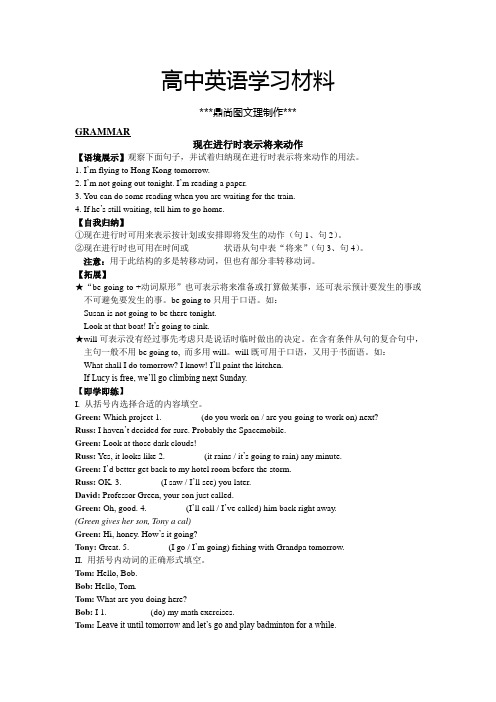
高中英语学习材料***鼎尚图文理制作***GRAMMAR现在进行时表示将来动作【语境展示】观察下面句子,并试着归纳现在进行时表示将来动作的用法。
1. I’m flying to Hong Kong tomorrow.2. I’m not going out tonight. I’m reading a paper.3. You can do some reading when you are waiting for the train.4. If he’s still waiting, tell him to go home.【自我归纳】①现在进行时可用来表示按计划或安排即将发生的动作(句1、句2)。
②现在进行时也可用在时间或________状语从句中表“将来”(句3、句4)。
注意:用于此结构的多是转移动词,但也有部分非转移动词。
【拓展】★“be going to +动词原形”也可表示将来准备或打算做某事,还可表示预计要发生的事或不可避免要发生的事。
be going to只用于口语。
如:Susan is not going to be there tonight.Look at that boat! It’s going to sink.★will可表示没有经过事先考虑只是说话时临时做出的决定。
在含有条件从句的复合句中,主句一般不用be going to, 而多用will。
will既可用于口语,又用于书面语。
如:What shall I do tomorrow? I know! I’ll paint the kitchen.If Lucy is free, we’ll go climbing next Sunday.【即学即练】I. 从括号内选择合适的内容填空。
Green: Which project 1. ________ (do you work on / are you going to work on) next?Russ: I haven’t decided for sure. Probably the Spacemobile.Green: Look at those dark clouds!Russ: Yes, it looks like 2. ________ (it rains / it’s going to rain) any minute.Green: I’d better get back to my hotel room before the storm.Russ: OK. 3. ________ (I saw / I’ll see) you later.David: Professor Green, your son just called.Green: Oh, good. 4. ________ (I’ll call / I’ve called) him back right away.(Green gives her son, Tony a cal)Green: Hi, honey. How’s it going?Tony: Great. 5. ________ (I go / I’m going) fishing with Grandpa tomorrow.II. 用括号内动词的正确形式填空。
Unit 3 Grammer 现在进行时表示将来
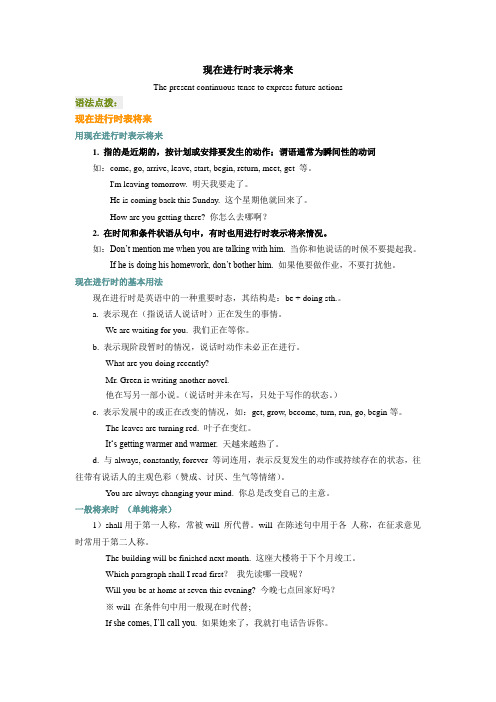
现在进行时表示将来The present continuous tense to express future actions语法点拨:现在进行时表将来用现在进行时表示将来1. 指的是近期的,按计划或安排要发生的动作;谓语通常为瞬间性的动词如:come, go, arrive, leave, start, begin, return, meet, get 等。
I'm leaving tomorrow. 明天我要走了。
He is coming back this Sunday. 这个星期他就回来了。
How are you getting there? 你怎么去哪啊?2. 在时间和条件状语从句中,有时也用进行时表示将来情况。
如:Don‟t mention me when you are talking with him. 当你和他说话的时候不要提起我。
If he is doing his homework, don‟t bother him. 如果他要做作业,不要打扰他。
现在进行时的基本用法现在进行时是英语中的一种重要时态,其结构是:be + doing sth.。
a. 表示现在(指说话人说话时)正在发生的事情。
We are waiting for you. 我们正在等你。
b. 表示现阶段暂时的情况,说话时动作未必正在进行。
What are you doing recently?Mr. Green is writing another novel.他在写另一部小说。
(说话时并未在写,只处于写作的状态。
)c. 表示发展中的或正在改变的情况,如:get, grow, become, turn, run, go, begin等。
The leaves are turning red. 叶子在变红。
It…s getting warmer and warmer. 天越来越热了。
d. 与always, constantly, forever 等词连用,表示反复发生的动作或持续存在的状态,往往带有说话人的主观色彩(赞成、讨厌、生气等情绪)。
高中英语必修一unit3Grammar-现在进行表将来
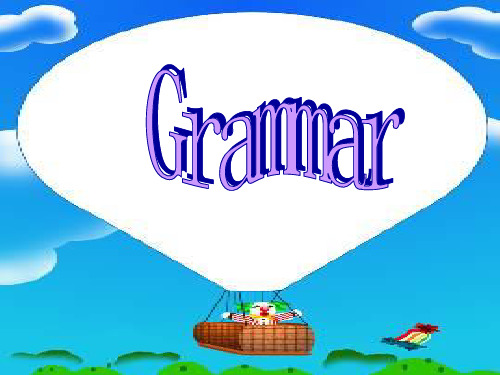
3) Bob is coming to visit his grandfather.
小结: 此三句是现在进行时态表示将来 的动作,表示按计划或安排将要进 行的动作.
这类动词通常是瞬间动作,只限 于少数动词,常见的有:
C. is closing down D. had had closed down (close down关闭,歇业)
2. I’ve won a holiday for two weeks to Florida. I___A___ my mum.
A.am taking B. have taken
C. take
(3)表示反复性或习惯性的动作 (常与always, continually[频繁地]连用,表示 赞扬,厌恶,不满,遗憾等感情色彩)
例句: He is always helping others. 赞扬
二.现在进行时表将来
Find the rules by yourself.
1) Betty is leaving for Guangzhou by plane tomorrow.
例句:You are to grow up one day. 总有一天你会长大。
Байду номын сангаас
附:高考题 1.Because the shop_____C______, all the T-
shirts are sold at half price
A. has closed down B. closed down
一.现在进行时
1.结构:be(am/is/are)+doing 2.用法: (1)表示说话时正在进行的动作(常与 时间状语now, at the moment连用)
grammar将来时的6种表达法

3. 我将派约翰去帮助你。 _I_’m__g_o_i_n_g__to__s_en__d_J_o_h_n__t_o_h_e_l_p_y_o_u_.
4. 约翰和玛丽买了一些家具, 他们打算 下个月结婚。
_J_o_h_n_a_n_d__M__a_r_y_b_o_u__g_h_t _s_o_m_e__fu_r_n_i_t_u_r_e, _th_e_y__a_r_e_g_o_i_n_g_t_o_m__a_r_r_y_n_e_x_t_m__o_n_t_h_.__
e.g. We are to discuss the report next Saturday.
六. be about to + 动词原形 be about to do sth, 表示即将发生的动作。
e.g. He is about to leave for Beijing.
注意: be about to不能与tomorrow, next week等表示明确将来时间的状语连用
---I’m sure your parents __a_re__p_ro_u_d__o_f __you, and I believe you’re going to have an exciting year….
Match the types of sentences with a, b, or c.
a 2.So I’m getting up at about 6 go get everything ready.
Present Continuous
c
3.I’m going to work as a volunteer teacher in a small country town in Inner Mongolia.
语法全解:现在进行时表示将来

语法全解:现在进行时表示将来一、现在进行时表示将来时注:现在进行时表示将来时,其计划性较强,往往暗示该动作是可以改变的1.现在进行时除表示现在正在进行的动作之外,还可以表示较近的将来,常有“意图”, “安排”或“打算”的含义.这种用法比较生动,给人一种期待感,此时所使用的动词多是转移动词,如:come, go, start, leave, stay, go, travel, take off, fly, see, arrive, return等.例如: I am leaving tomorrow. 我明天要离开.Are you staying here till next week? 你要在这儿呆到下周吗?I am going.我要走了.We’re leaving for Nanjing tomorrow.我们明天就去南京.When are you leaving? 你们什么时候动身?They’re coming here this afternoon. 他们今天下午来这儿.2.表示将来的现在进行时除用于转移动词外,也可用于某些非转移动词.如do, buy, meet, have, play, publish等,此时句中一般要要表示将来的时间状语.例如: What are you doing next Sunday? 下星期天你打算干什么?My mother is buying me a bike soon. 我妈妈不久将给我买一辆自行车.I’m meeting you after class. 课后我要找你.3.现在进行时偶尔也表示较远的将来.例如: When I grow up, I’m joining the army. 我长大了要参军.4.表示将来的现在进行时有时含有“决心”的意思,多用于否定结构中.例如: I’m not going there. 我不去那儿了.I’m not waiting for him any longer. 我不再等他了.二.一般现在时表将来时注:一般现在时表示将来时,客观性较强,多指按时刻或规定要发生的动作或事件,适用于这种用法的动词往往表示“出发”, “到达”等,如arrive, leave, start, go等.例如: The plane arrives at 2:30 this afternoon. 飞机将于今天下午2:30抵达.1/ 1。
现在进行时表将来的用法归纳

现在进行时表将来的用法归纳在英语语法中,现在进行时通常用于描述正在发生的动作,但有时候它也可以用来表示将来的计划或安排。
这种用法可能会让学习者感到困惑,但其在实际交流中却非常常见且实用。
接下来,让我们详细归纳一下现在进行时表将来的用法。
首先,我们要明确现在进行时表将来的基本概念。
当现在进行时用于表示将来时,它强调的是计划、安排已经确定,并且即将发生的动作。
这种用法常常与表示将来时间的状语连用,比如“tomorrow(明天)”“next week(下周)”“soon(不久)”等。
比如,“I'm leaving tomorrow”(我明天离开。
)在这个句子中,“am leaving”就是现在进行时,但它表达的是一个将来的动作,即明天的离开已经计划好并且确定了。
再看,“She is coming here next week”(她下周来这儿。
)“is coming”是现在进行时,结合“next week”这个时间状语,清晰地表达了她下周要来这里的计划。
那么,现在进行时表将来常用于哪些动词呢?常见的有“go”“come”“leave”“arrive”“start”“begin”“return”等表示移动或开始结束的动词。
例如,“The train is arriving soon”(火车很快就到。
)“arriving”体现了火车即将到达的这个未来动作。
又如,“He is starting work next month”(他下个月开始工作。
)“is starting”表明了下个月开始工作这一将来的安排。
除了单个动词,一些动词短语在这种情况下也会使用现在进行时来表示将来。
比如“be going to”结构,虽然它本身就有表示将来的意思,但当它用于进行时态时,更加强调计划的确定性和紧迫性。
比如,“I'm not going to watch TV tonight I have too much homework to do”(我今晚不打算看电视。
新课标UNIT 3GRAMMAR用现在进行时表示将来

当句子涉及确切的计划、明确的意图和为将来安排好的活动时,现在进行时可用于表示将来。
现在进行时经常用于表示将来确切的计划。
练一练!
注意!
另外,表示将来的动作或状态,还可用以下几种形式:
i shall be seventeen years old next month.
② be going to+动词原形:表示即将发生
的或最近打算进行的事。
③be to+动词原形:表示按计划要发生的事或征求对方意见。
④be about to+动词原形,表示即将发生的动作,不与表示将来的时间状语连用。
我正要去游泳,这时向导大声叫我不要去。
你什么时候动身去度假?
--- my plane is taking off at 9:20, so i must be at the airport by 8:30.
我乘坐的飞机将于9:20分起飞, 所以我必须在8:30之前赶到机场.
⑥一般现在时表示将来时
the plane takes off at 10:10. that is , it’s leaving in ten minutes.
(2)用在状语从句中用一般现在时代替将来时
if you do that again, i’ll hit you.
(3)用在i bet 和i hope后面, 常用一般现在时表将来.
我敢说你明天不到10点是不会起床的.
⑦单纯叙述未来的事实,可以用将来进行时,也可表示按计划安排将来要执行的动作。
现在进行时表将来的用法归纳
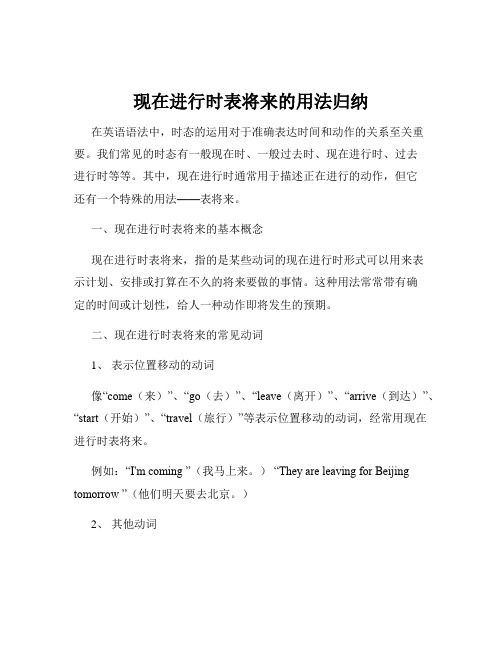
现在进行时表将来的用法归纳在英语语法中,时态的运用对于准确表达时间和动作的关系至关重要。
我们常见的时态有一般现在时、一般过去时、现在进行时、过去进行时等等。
其中,现在进行时通常用于描述正在进行的动作,但它还有一个特殊的用法——表将来。
一、现在进行时表将来的基本概念现在进行时表将来,指的是某些动词的现在进行时形式可以用来表示计划、安排或打算在不久的将来要做的事情。
这种用法常常带有确定的时间或计划性,给人一种动作即将发生的预期。
二、现在进行时表将来的常见动词1、表示位置移动的动词像“come(来)”、“go(去)”、“leave(离开)”、“arrive(到达)”、“start(开始)”、“travel(旅行)”等表示位置移动的动词,经常用现在进行时表将来。
例如:“I'm coming ”(我马上来。
)“They are leaving for Beijing tomorrow ”(他们明天要去北京。
)2、其他动词除了上述表示位置移动的动词,还有一些动词如“do(做)”、“have (有)”、“meet(见面)”等,在特定的语境中也可以用现在进行时表将来。
比如:“What are you doing this weekend? ”(这个周末你要做什么?)这里的“doing”实际上是在表示将来的计划。
三、现在进行时表将来的时间状语当使用现在进行时表将来时,通常会伴有一些特定的时间状语,以更明确地表明动作发生的时间在将来。
常见的时间状语有:“tomorrow (明天)”、“next week(下周)”、“soon(不久)”、“in a few days(几天后)” 、“this evening(今晚)”等等。
例如:“She is starting work next week ”(她下周开始工作。
)“We are meeting him this evening ”(我们今晚要见他。
)四、现在进行时表将来与一般将来时的区别虽然现在进行时和一般将来时都可以表达将来的动作,但在使用上还是有一些细微的区别。
Grammar现在进行时表示将来

Grammar现在进行时表示将来一般现在时:一般现在时:am/is/are+p.p 一般过去时:一般过去时:was/were+p.p 现在进行时:现在进行时:am/is/are being+p.p 过去进行时:过去进行时:was/were being +p.p 现在完成时:现在完成时:have/has been+p.p 过去完成时:过去完成时:had been+p.p 一般将来时:一般将来时:will/shall be +p.pGrammar现在进行时的被动语态The present continuous passive voice 表示“某人/事此时此刻正在被事此时此刻正在被。
”, 表示“某人事此时此刻正在被主语是动作的承受者, 主语是动作的承受者表示说话时或现阶段某个被动的动作正在进行。
或现阶段某个被动的动作正在进行。
谓语动词的形式为“ 谓语动词的形式为“is / are / am + being+ 过去分词”。
如果去掉being, 就成为一般过去分词” 如果去掉现在时被动语态或系表结构。
试比较下列句子现在时被动语态或系表结构。
试比较下列句子: Look! The children are being taken care of by their aunt. 孩子们现在正由姑母照看着。
瞧! 孩子们现在正由姑母照看着。
(指现在的情况指现在的情况) 指现在的情况Children are taken good care of at school. 孩子们在学校被照看得很好。
(指通常的情况孩子们在学校被照看得很好。
指通常的情况) 指通常的情况The report is being written by one of the best students. 报告正在由一个最好的学生写着。
报告正在由一个最好的学生写着。
The report is well written. 报告写得很好。
报告写得很好。
(系表结构系表结构) 系表结构1. 肯定形式:am/is/are+being+过去分词肯定形式:+ + The house is being painted. 房子正在被粉刷。
现在进行时表将来
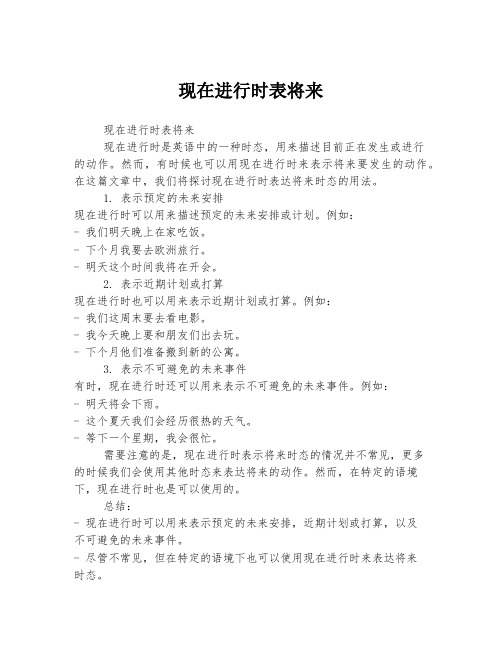
现在进行时表将来
现在进行时表将来
现在进行时是英语中的一种时态,用来描述目前正在发生或进行
的动作。
然而,有时候也可以用现在进行时来表示将来要发生的动作。
在这篇文章中,我们将探讨现在进行时表达将来时态的用法。
1. 表示预定的未来安排
现在进行时可以用来描述预定的未来安排或计划。
例如:
- 我们明天晚上在家吃饭。
- 下个月我要去欧洲旅行。
- 明天这个时间我将在开会。
2. 表示近期计划或打算
现在进行时也可以用来表示近期计划或打算。
例如:
- 我们这周末要去看电影。
- 我今天晚上要和朋友们出去玩。
- 下个月他们准备搬到新的公寓。
3. 表示不可避免的未来事件
有时,现在进行时还可以用来表示不可避免的未来事件。
例如:
- 明天将会下雨。
- 这个夏天我们会经历很热的天气。
- 等下一个星期,我会很忙。
需要注意的是,现在进行时表示将来时态的情况并不常见,更多
的时候我们会使用其他时态来表达将来的动作。
然而,在特定的语境下,现在进行时也是可以使用的。
总结:
- 现在进行时可以用来表示预定的未来安排,近期计划或打算,以及
不可避免的未来事件。
- 尽管不常见,但在特定的语境下也可以使用现在进行时来表达将来
时态。
简而言之,尽管现在进行时不是常见的将来时态的表达方式,但在特定场合下可以这样使用。
掌握这一用法能够帮助我们更好地理解和运用英语语法。
unit3.grammar 现在进行时表将来

What are you doing next Friday?
He is leaving for Beijing tomorrow morning.
The train is arriving soon. He is starting the work in a few minutes.
I’m leaving at seven tonight. The plane is taking off in a few minutes. The car is coming.
A. would meet C. meets B. is meeting D. had met
表将来的几种方式
1)will / shall + 动词原形
I shall be seventeen years old next month. 2)be going to + 动词原形 We are going to have a meeting this afternoon. 3)be to + 动词原形 Are we to go on with this work? Audrey and Jimmy are to be married in June.
6. —What are you going to do this afternoon?
—I am going to the cinema with some
friends. The film ___ quite early, so we ____ to the bookstore after that. C A. finished; are going B. finished; go
Right now it is the summer vacation and I’m helping my dad on the farm. She is always changing her mind.
21-22版:Grammar——现在进行时表将来(创新设计)
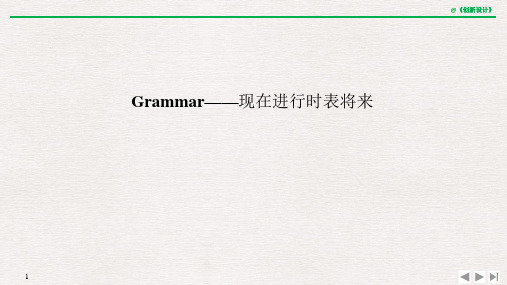
Grammar——现在进行时表将来
1
[思维导图]
2
@Hale Waihona Puke 创新设计》@《创新设计》一、现在进行时表示将来 现在进行时可以表示将来,常含有“意图”“安排”或“打算”的含义,这
种用法可以使句子更加生动,给人一种期待感。具体用法如下: 1.常表示最近或较近的将来,所用动词多是表示位置转移的动词,但偶尔也表示较
远的将来。 I’m meeting you after class.下课后我找你。 2.表示将来的现在进行时有时含有“决心”的意思,多用在否定结构中,有时也用 在肯定结构中。 I’m not waiting any longer.我不再等了。
3
@《创新设计》
3.现在进行时也可在时间、条件或原因状语从句中表示将来。 When you are passing by my front door,please drop in. 你什么时候路过我家,请进来坐。(时间状语从句)
4.不是所有的动词都可以用进行时态表将来,只有表示具体位置移动意义的动词及 少部分其他意义的动词才可以用进行时态表将来。 此类动词(词组)如下:arrive,begin,come,die,go,leave,end,return,start, travel,fly,stop,close,drive,fall,remain,stay,move,land,leave for,take off,see...off等。 Hurry up.The plane is taking off soon. 快点。飞机马上就要起飞了。
5.一般现在时可表示按时刻表、日程表的安排所发生的将来的动作,也可用于状语 从句中表示将来。 The next plane leaves at 6 pm.下一航班下午6点起飞。
Book 1 Unit 3 Grammar 现在进行时表示将来

Book 1 Unit 3 Grammar 现在进行时表示将来现在进行时的构成:肯定式:主语+ be(is/am/are)+ v-ing否定式:主语+ be(is/am/are)+ not + 现在分词一般疑问式:be(is/am/are)+ 主语+ 现在分词特殊疑问句:特殊疑问词+ be + 主语+ 现在分词?用法:1. 表示说话时正在进行的动作或状态。
Dad is writing an e-mail now. 爸爸正在写电子邮件。
Look! What are they watching? 看,他们正在看什么?2. 表示现阶段正在进行的动作,虽然此刻动作不一定正在进行。
I am working on a new book about stories in schools. 我正在写一本关于校园故事的书。
So far as I know, they are studying in the same school. 就我所知,他们在同一所学校上学。
3. 表示按计划或安排在不久的将来要做或者预定要做的事情。
这种结构中常用表示方位移动的动词。
如arrive, leave, travel, start, move, come, go, fly 等。
The train is arriving in 5 minutes. 火车将在五分钟后到达。
What time is the plane taking off? 飞机将在什么时候起飞?Tom is coming here next week.汤姆下周要来这儿。
4. 现在进行时与副词always, constantly, forever等连用,强调不断重复,表示赞成、厌烦、生气、埋怨等语气。
He is always changing his mind. 他总是改变主意。
He is forever thinking of others. 他永远都为别人着想。
5. 以下几种表达方式也可以表示将来含义:1) will/shall do表达单纯将来,可用于说话时才想到或决定的事。
八年级上册英语语法《现在进行时表将来》知识点整理
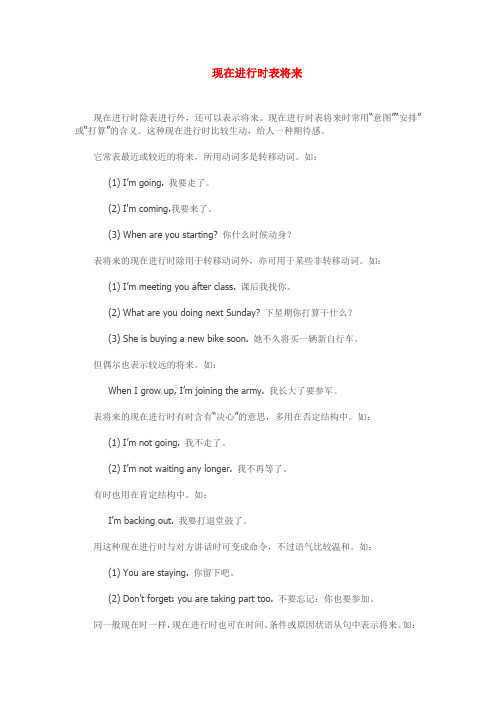
现在进行时表将来现在进行时除表进行外,还可以表示将来。
现在进行时表将来时常用“意图”“安排”或“打算”的含义。
这种现在进行时比较生动,给人一种期待感。
它常表最近或较近的将来,所用动词多是转移动词。
如:(1) I’m going. 我要走了。
(2) I'm coming.我要来了。
(3) When are you starting? 你什么时候动身?表将来的现在进行时除用于转移动词外,亦可用于某些非转移动词。
如:(1) I’m meeting you after class. 课后我找你。
(2) What are you doing next Sunday? 下星期你打算干什么?(3) She is buying a new bike soon. 她不久将买一辆新自行车。
但偶尔也表示较远的将来。
如:When I grow up, I’m joining the army. 我长大了要参军。
表将来的现在进行时有时含有“决心”的意思,多用在否定结构中。
如:(1) I’m not going. 我不走了。
(2) I’m not waiting any longer. 我不再等了。
有时也用在肯定结构中。
如:I’m backing out. 我要打退堂鼓了。
用这种现在进行时与对方讲话时可变成命令,不过语气比较温和。
如:(1) You are staying. 你留下吧。
(2) Don’t forget: you are taking part too. 不要忘记:你也要参加。
同一般现在时一样,现在进行时也可在时间、条件或原因状语从句中表示将来。
如:(1) when you are passing my way, please drop in. 你什么时候路过我们家,请进来坐。
(用于时间状语从句)(2) If they are not doing it, what am I to do? 如果他们不干,那我该怎么办>?(用于条件状语从句)(3) She is going to the dentist tomorrow because she is having a tooth filled.表示将来的现在进行时也可用在间接引语中,表示说话人相信它将是事实。
1Unit3Grammar现在进行时表一般将来

He is playing football now.
He
is eat ing
now.
ing. The teacher is write
ing. They are dance
The man is run ning now.
The boy is swimming now.
will be going to 个人主观 有迹象表明 看法
will be doing 说话时做 be going to 安排计划 意图打算 的决定 更确定
• 3. 表示交通方式、行程安排的动词,例如 fly, walk, ride, drive, take (a bus, a taxi) 等的 _________________________________ 现在进行时也经常用于表示将来。
Exercises
1.Li Hua is ________ leaving (leave) for Guangzhou by plane at 3:00 this afternoon. His is seeing (see) him off. brother Li Lin ________ 2.It’s half past one now. They __________ are waiting (wait) for a taxi outside the school gate. are going (go) to the North China by 3.We_________ are staying (stay) in train next week. We __________ are going (go) Beijing for a week. They ________ to Xi’an. They __________ are getting (get) there by air.
初中英语人教新目标九年级全一册Grammar中考英语现在进行时表将来时的用法课件

表将w来ill 用时s于ha的一ll用、各于二第、种一三人结、称人构称,
•2. will/shall do
带有说话人的主观态度和看法 be going to do
1)打算在将来做某事。
2)有迹象表明将要发生某事。
• e.g. 1)如果你不努力,就会考试失败。
If you don’t work hard, you will fail the exam.
•4.Look at the lightninggo.iIntg_____________(rain).
•5.Our English teacher ___________(leave) in two days.
is going to rain
is leaving
II. 选择题.
1.--Is this handbag yours?
•4. be to do
1)表示按计划、安排即将发生的动作。 (常用于报纸和广播,用以宣布官方的 计划或决定。)
e.g.: The President is to visit China next year.
2)表示命令、禁止等。
e.g.: You are to listen to me. Do you understand?
内涵:
• 主要用于表示按计划或安排将要发生的动作或事件。这种用法给人 一种期待感,常表示最近或较近的将来。
e.g.: We're starting for Chengdu this afternoon.
表将来时的各种结构
•1. 现在进行时表将来时。
常用与该表达法的动词: go, come, arrive, fly, start, leave, return, travel, stay, remain, do ,have, play, work, wear, spend, meet 等等。
- 1、下载文档前请自行甄别文档内容的完整性,平台不提供额外的编辑、内容补充、找答案等附加服务。
- 2、"仅部分预览"的文档,不可在线预览部分如存在完整性等问题,可反馈申请退款(可完整预览的文档不适用该条件!)。
- 3、如文档侵犯您的权益,请联系客服反馈,我们会尽快为您处理(人工客服工作时间:9:00-18:30)。
现在进行时
1. 表示说话时正在进行的动作或存在的状态。 We are waiting for you now. 我们正在等你。 时间状语:now, at this moment…
2.表示现阶段在进行的情况。
--- What are you doing recently(最近)? --- I am preparing for the mid-tern exam recently . (我最近在为期中考而复习。)
时间状语:these days, today, this week, this term…
3. 表示反复性或习惯性的动作,常与always,
continually等连用,表示说话人的赞扬、厌恶、
不满和遗憾等感情色彩。
She is always changing her mind.
她老是改变注意。
She is always thinking about others first.
Summary
现在进行时be doing表示将来
现在进行时可用来表示一个在最近按计划或 安排打算要进行的动作;通常带一个表将来的 时间状语, 但有明确的上下文时无须指出时间。 能用进行时表将来的动词(并非所有动词): go, come, leave, start, arrive, give, return, sleep ,stay, play, do, take, get, see off, travel, fly, drive, walk, reach, meet…
W: It’s hard to say. If the weather is fine, I think we’ll be able to ride 75 km a day. R: what about the weather in Qinghai Province?
W: The weather forecast is not good so we _________ are taking (take) a large parcel of warm clothes with us. are staying R: Where you _________ (stay) at night? W: Usually in our tent, but sometimes in the village along the river bank.
Exercise 2
Travel Plan
The Browns are going (go) to the ________
North China by train next week.
They __________ (stay) in Beijing are staying
for a week. They ________ (go) to are going
I’m babysitting on Monday. I’m doing my laundry on Tuesday. I’m working overtime on Wednesday. I’m working out on Thursday. I’m visiting relatives on Friday.
现在进行时 表将来
时态 时间
← Warming Up 2 (P17)
Sentence pattern:
When are you leaving? = When are you going to leave? =When will you leave? Where are you staying ? How are you going to…? How long are you staying in…? When are you arriving in/at…? When are you coming back?
I'm babysitting on Thursday
She is babysitting on Monday. doing her laundry on Tuesday. working overtime on Wednesday. working out on Thursday. visiting relatives on Friday. going out with the man on the weekend. laundry 洗衣店 relative 亲戚 Listen to the song and then answer the questions: Q: What is she doing on Monday/Tuesday/ Wednesday / Thursday/ Friday / weekend?
1) come, go, stay, arrive, leave 等趋向动词的现 在进行时经常用于表示将来确切的计划。
I am leaving China in two hours.
我将会在两个小时后离开中国。
2) 表示交通方式、行程安排的动词,例如 fly,
walk, ride, drive, take (a bus, a taxi)等的现在
进行时也经常用于表示将来。
I am flying to Japan tomorrow.
明天我会飞往日本。
Exercise 1
用现在进行时翻译下列句子。 1. 我星期五动身去北京。 2. 我的朋友今晚过来。 3. 下周五我们乘飞机去上海。 V. leave / go come fly
4. 下课后我们打算在操场踢足球。 play
1.我星期五动身去北京。leave / go
I’m leaving for Beijing this Friday.
2. 我的朋友今晚过来。 come
My friends are coming over this evening.
3. 下周五我们乘飞机去上海。 fly
We are flying to Shanghai next Friday. 4. 下课后我们打算在操场踢足球。 play After class we are playing football on the playground.
表将来的时态其他方法:
He will write you a letter next week. We’re not going to have any classes next week. The next train leaves at 9:15.
注意
另外,表示将来的动作或状态,还可用以下几种形 式: ① will / shall+动词原形: 不以主观意志为转移 的,客观的。 I shall be seventeen years old next month. ② be going to+动词原形:表示即将发生的或最 近打算进行的事。 We are going to have a meeting today. ③ be to+动词原形:表示按计划要发生的事或征 求对方意见,事先安排好的。 Are we to go on with this work?
Xi’an. They __________ (get) there are getting
by air.
are travelling R: Miss Wang, I hear that you_________ (travel) along the Mekong River. Have you got everything ready? W: Almost. R: When are W: Next Monday. R: How far each day? are you _________ (cycle) cycling leaving you ________ (leave)?
Grammar
The Present Continuous Tense for future use 现在进行时 表 将来
现在进行时
Be (am , is ,are ) + v. ing I am He/she/it is We/you/they are
现在进行时用法:
He is doing his omework now. Right now it is the summer vacation and I’m helping my dad on the farm. She’s always changing her mind. Mother is taking us home to see my grandma on Sunday
I'm babysitting on Thursday --Would you like to go out on Monday? -- No, sorry, I can’t. -- Why not? -- I’m babysitting on Monday. -- Would you like to go out on Tuesday? -- No, sorry, I can’t. -- Why not? -- I’m doing my laundry on Tuesday. -- Would you like to go out on Wednesday? -- No, sorry, I can’t. -- Why not? -- I’m working overtime on Wednesday. -- Would you like to go out on Thursday? -- No, sorry, I can’t. -- Why not? -- I’m working out on Thursday. -- Would you like to go out on Friday? -- No, sorry, I can’t. --Why not? -- I’m visiting relatives on Friday. --Would you like to go out on the weekend? -- Well… maybe!
